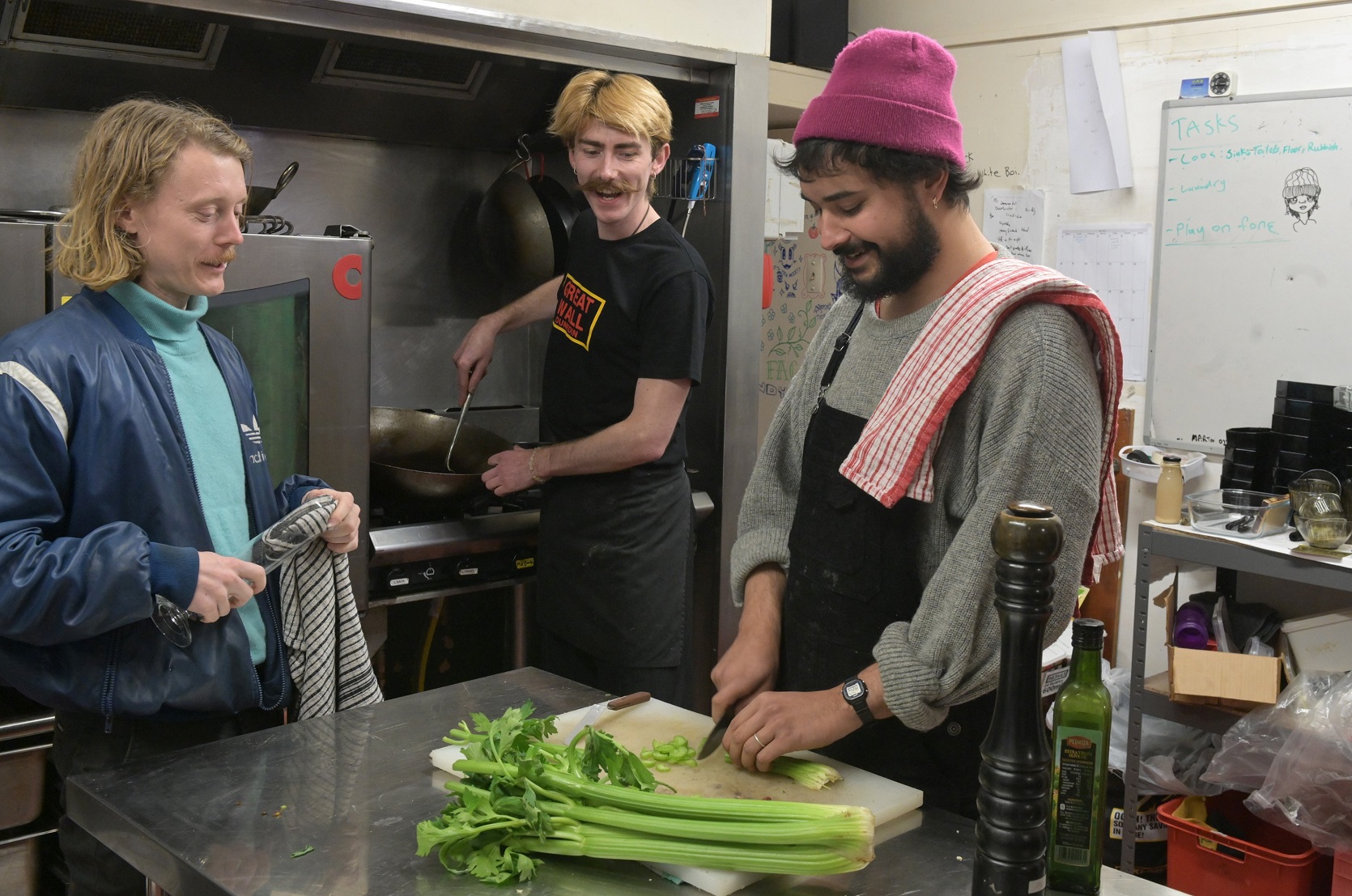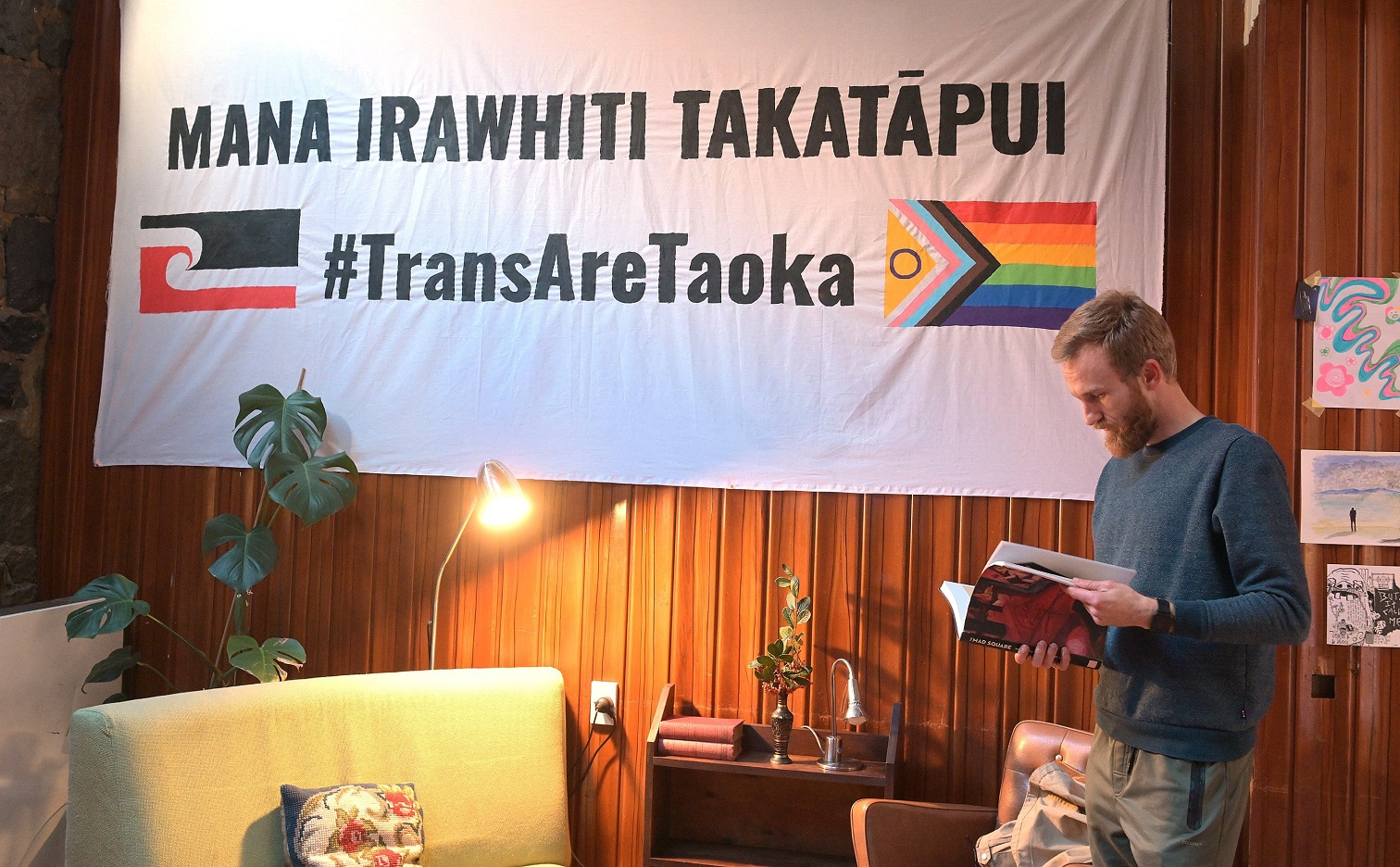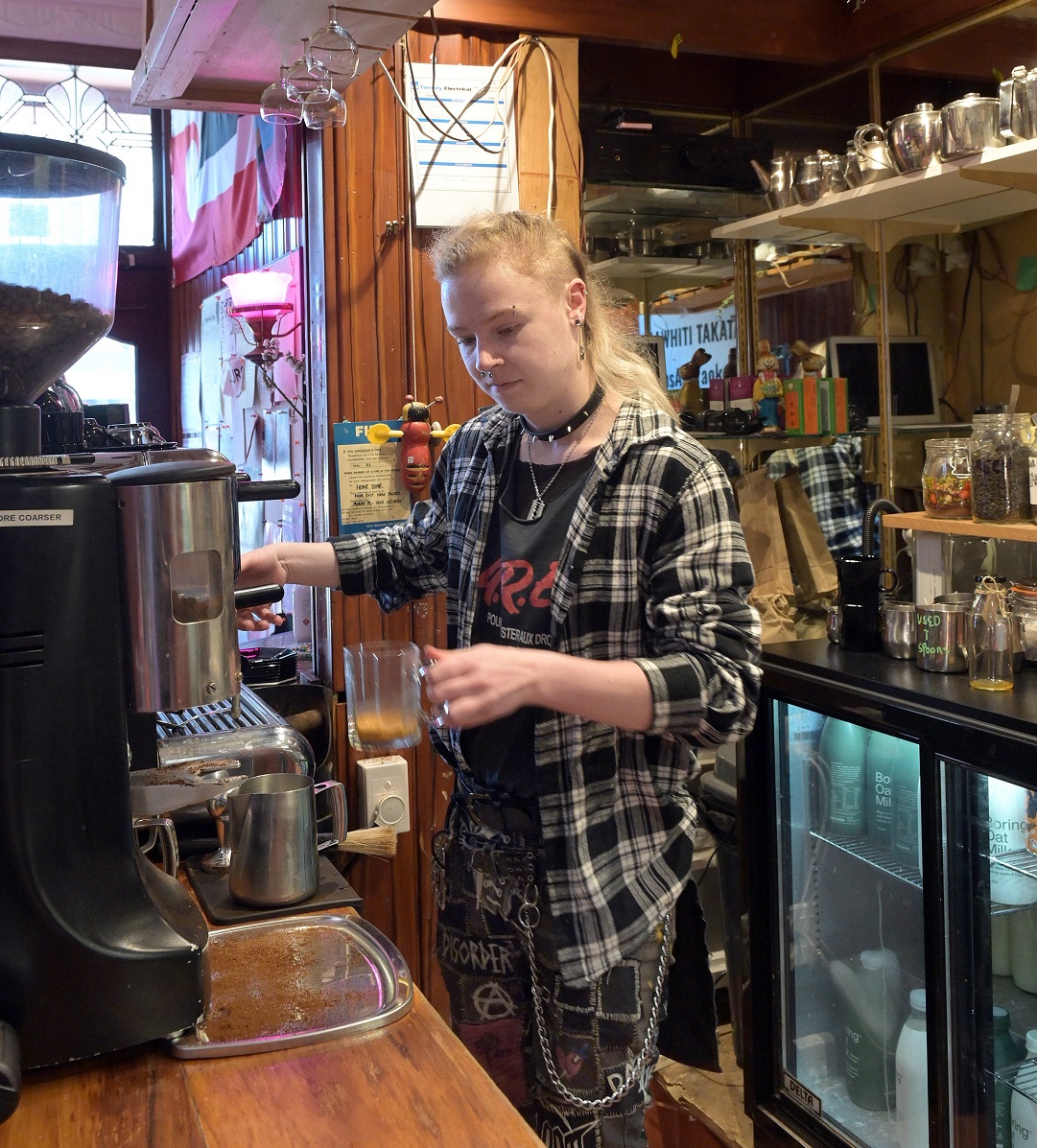
A guy walks into Yours cafe in Moray Pl. He’s got kind of anti-establishment hair and an air of sideways about him. Turns out he’s a poet. What he wants to know is whether he and his fellow poets can meet there, at Yours.
"Looking at your website, your values kind of fit," he says.
So, what he didn’t say was, "I’ve heard you make your own nut milk", or "people talk highly of your friands", or even "you appear to have the right number of chairs".
No, he said "your values kind of fit".
Here’s what it says on the Yours website about those values: "Yours is a worker-owned and managed cafe/venue that imagines a better food system and provides space for radical action, music, art and co-operation."
It also introduces the cafe as a real world expression of Ōtepoti Possibilities Co-operative (ŌPCo), which is "organising to explore possibilities for a post-capitalist future".
Go to the ŌPCo page and it says "We’re waving the black flag".
They are anarchists, Yours is anarchist. Not Sex Pistols-type anarchists — though "Be Gay, Do Crimes" is painted on the floor — but proper critical thinkers, manifesto drafters and propagandists by the deed. Their deed being a cafe.
In the end, the poets are meeting elsewhere this year — down at the Athenaeum, if you’re interested — but the fact remains, the Yours values, the ŌPCo view of the world resonated. Is resonating.
Yours co-operative member Carl Naus was on hand to field the poet’s inquiry — which immediately ran into difficulty because their preference was for an evening already allocated to the ŌPCo film club — and says his impression is that there are a lot of people out there interested in or searching for alternatives to our society’s prevailing values, modus operandi and outcomes.
That would include capitalism (rentier and otherwise) certainly, the prison industrial complex, obviously, and climate collapse, necessarily. But that’s by no means exhaustive.
"There are a lot of people like myself, and other members of the co-operative, who are really into reading books about this kind of stuff and understanding all the theory and trying to understand why we are where we are and understand the power that shapes that," Naus says.
"I think there are a lot of other people who just feel it. They feel that something is wrong."
Naus finishes his sentence, then has a dread feeling himself. He has some baking in the Yours oven and needs to check it. Insightful social commentary is all very well, but you don’t want to overcook stuff.
On his return, he says he was himself there once, when he was younger, unable to articulate that unease.
"I didn’t understand the system or that there were other possibilities, but understood that something was deeply wrong."

Naus is a serious person. Serious but friendly, his Guevara (or perhaps more properly Malatesta) good looks regularly bisected by a wide smile that seems to stand guard against any didactic tendencies.
The venue’s doing the same balancing act. Serious but friendly.
Serious about sourcing its food ethically, sustainability — they began making their hummus out of split peas because they could be sure of where they were grown and how they were grown, and they’re happy to use food that "capital has lost interest in".
Serious about a different sort of relationship with the people who might elsewhere be referred to as customers — there is no fixed price for food and drink. Indeed, you can pay in kind.
But also just explicitly, inclusively, gregariously, friendly.
Which helps explain the carnival colour scheme inside, a riotous palette of ideas, motifs and hues hand-painted across the floor and up the walls.
"We tried to make sure it didn’t seem aggressive, because people have this notion of anarchists as crazy people who light fires and stuff," Naus says.
Auckland-raised Naus’ background helps explain where some of this politics is coming from, the determination to try something different.
His entry into political organising was around climate change, as a founding member of the big smoke’s branch of 350.org, then took in protests against the New Zealand Defence Industry Association’s annual forum — regarded by Naus and others as a "weapons expo".
"We blockaded them year after year to the point where they stopped," he says.
However, a constant of those involvements was the struggle to find places to meet, or hold trainings.
"We would use the trades hall building or a library building ... we never had somewhere to go after an action and coalesce. Somewhere safe. In fact, one time at an Auckland Peace Action meeting we got kicked out of this space halfway through a meeting."
It’s hoped Yours can help fill that sort of gap here.
"I think in creating what you might call a radical space, that’s what we might call this space, it is not just creating that space but maintaining a vibe that is both true to its values but is also inclusive of people."
The traditionally anarchist bit about how this all works is the worker co-operative nature of it.
No bosses and a commitment to sharing what’s produced, each according to their needs kind of style. The belief is that those doing the work are in the best position to make decisions about it.

He says manaakitaka, hospitality, is central to what they are doing.
"The fundamental act of feeding someone is, like, ‘I care about your survival, I want to nourish you’. You are being looked after," he says.
Both Brazil and Naus compare the connected way in which they are working and the connections Yours is attempting to build with the atomising and individualistic nature of Western capitalism, a system they say has no solutions for the many problems it causes.
Here’s where the practical work of running their cafe, music venue, meeting space and salon, meets the theory, and where the work of late anarchist anthropologist and activist David Graeber is influential, in particular, his recent book The Dawn of Everything.
It’s a solid volume, sifting through tens of millennia of human history, but there are a couple of central underpinning themes.
One is the idea of schismogenesis, the other is the freedoms that are necessary to keep people free.
Schismogenesis describes people’s tendency to define themselves in opposition to someone or something else. So, for example, capitalism is currently failing to feed or house people — witness the cost of living crisis, spiralling rents and homelessness — so defining yourself in opposition to that starts to look pretty good.
The freedoms Graeber talks about are the freedom to walk away, the freedom to disobey and the freedom to shape entirely new social realities.
All of this appears to be in play at Yours.
Another of the co-operative’s members, Dylan Pyle, swings into the kitchen and is happy to stop and talk politics, and schismogenesis.
Talking politics is definitely part of the vibe here.
Capitalism, with its elevation of the individual, creates distrust, Pyle says. What they’re trying to do at Yours, is build relationships — define themselves in opposition to capitalism’s way of reducting everything to a transaction, to a bit part in gross domestic product.
"So we are trying to build a more trusting environment and an environment where you can have other types of relationships outside of direct commercial interactions," he says.
Graeber’s book is cause for hope in that context, as it identifies myriad societies, in myriad times and places that have built community without lapsing into either inequality or domineering authority.
Human society has experimented with all sorts of ways of organising, Graeber argues. People have always been able to make choices and nothing is set in stone.
Precisely what might be best in our situation, in our time, is the question, and Pyle says they are explicitly trying not to prejudge it.
"We don’t actually know what the best way to do things is."

"So, I guess, in a way it is not about us in particular but is about us trying something else, in the hope that some of these ideas can spread further or wider, or people can engage with these ideas on a practical level."
Brazil looks up from his mixing bowl to say it’s a process of questioning power. Anarchism is a process rather than a prescription.
"It is the process to get outside the box, so we can look back and go ‘that box is cooked’. Why were we in there? Then to be able to go somewhere beyond.
"I don’t know what that is but I know it is there. I know it is possible."
We can be sure capitalism’s box is cooked because it’s squeezing the life out of everyone, he says.
"The phrase ‘the cost of living’ is such a grotesque phrase," he observes with conviction. And yet it has become normalised.
"There shouldn’t be a cost to live."
Most people he knows spend two-thirds of their income on housing, on rent, he says.
"A third left over barely covers the food, if that. So it is clear that the current economic system is a death spiral."
Who decided rent should be a normal and how did working people become an externality, he asks.
"We are living in modern day feudalism."
The Yours crew is hardly alone in identifying that capitalism as currently practised is heading for a cliff.
From the reforming prescriptions of New Zealand writer Max Harris’ "politics of love", based on care, community and creativity, to Kate Raworth’s Doughnut Economics, and the likes of Yanis Varoufakis’ novel Another Now, in which today’s inequalities are overthrown in favour of democratic worker co-operatives, there is plenty of searching for what comes next.
That is not, of course, unique to our times.
Brazil quotes anarchist heroine Ursula Le Guin’s 1974 novel The Dispossessed, from a paragraph about suffering: "If instead of fearing it and running from it, one could ... get through it, go beyond it. There is something beyond it."
He says it captures something of the Yours endeavour, an attempt to push beyond contemporary predicaments.
Anarchism has not traditionally been a big part of New Zealand politics.

However, while Yours is forging its own path, some of what its members talk about harks back to the writings of anarchism’s big-name progenitors.
A fundraising effort launched recently by Yours to establish a "trans mutual aid fund", nods at Peter Kropotkin’s seminal work of anarchist theory, Mutual Aid — published in 1902 as a riposte to the social Darwinism of Herbert Spencer and Thomas Huxley.
Kropotkin argued then that co-operation was a more significant driver of evolution than Spencer’s Hobbesian "survival of the fittest", and key to the best forms of human organisation.
Earlier, Naus, back from checking on his baking again, had made what seemed like a related observation.
To some, he says, they’ll look like absolute loonies, for their ideas and the way they’d like the world to be organised.
"But for a lot of people those things are really normal and that is because we organise in this way in our familial lives and with our friends.
"All we are trying to do is extend that familial way of organising to a wider group of people. It is just sharing."
It’s why he thinks it will work.
"Because people know how to do this thing, it is just pushing the circle out a little further."
And in our context here, Brazil says, there are already other models to look to; te tino rakatirataka, hapūtaka.
"What we are doing is not so radical, I think. What is more radical is continuing as we are, because what we are doing, as David Graeber talks about, is how people have lived since time immemorial.
"It is a collective mindset."
Yours is also fun, Pyle adds.
"Having fun in the thing that you are doing is very unusual under capitalism ... the thing that we have designed has room for fun. And room for other experiences."
There are shades here of the ubiquitous misquote attributed to anarcho-feminist icon Emma Goldman: "If I can’t dance, it’s not my revolution."
Or maybe it brings into view a slimmer volume by David Graeber, posthumously published, Pirate Enlightenment, about an egalitarian "free colony" experiment those cutlass-wielding freebooters established on Madagascar in the late 17th century, called Libertalia.
It could be Yours isn’t just flying the black flag.












